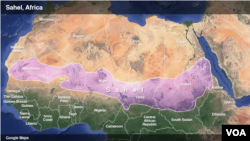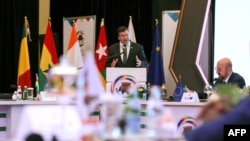West African leaders met in Accra Tuesday to discuss terrorism and worsening security in the region. The Accra Initiative members, which include Benin, Burkina Faso, Ivory Coast and Togo, are discussing preventing spillover of terrorism from the Sahel. European forces have been withdrawing from the region while Russian influence has been growing.
The Accra Initiative is a cooperative and collaborative security mechanism between seven West African countries as they face increasing threats and attacks from Islamist militants across their northern borders in Burkina Faso and Niger.
Addressing the maiden high-level counter terrorism conference of the Accra Initiative, Ghana’s President Nana Akufo-Addo said it has become imperative for member states to collaborate to counter rising levels of terrorism.
“West Africa continues to suffer from the effect of the scourge of terrorism and violent extremism, spreading rapidly across the region,” Akufo-Addo said. “Today, the terrorist groups emboldened by their apparent success in the region are seeking new operational grounds, a development that has triggered the southward drift of the menace from the Sahel to coastal West Africa.”
The goal of the Accra Initiative, the Ghanaian leader said, is to curb that spread of terrorism. He added that member states will own the initiative but will require their foreign partners to support them.
"Our assessment points to the fact that support from members of international community will be needed, but we remain firm in our commitment to shoulder a greater part of the responsibility required while engaging international partners who are willing to respect our status as a home-grown initiative,” he said.
Western nations such as Britain, France and Germany are withdrawing from peacekeeping operations in Mali, a situation likely to exacerbate the porous security situation in West Africa.
James Heappey, the British Armed Forces Minister said Britain and other Western countries will continue to be allies and partners with West African states in fighting violent extremism and terrorism but will not dictate to them how to deal with their problems.
“I am acutely aware that there is a security challenge and the U.K. armed forces already enjoy great relationship with many of the countries within the Accra Initiative and we stand ready to build on that,” he said. “This is a regional problem that you have here in West Africa and it’s right that you seek to provide solutions. But given that the instability and security here so profoundly have a consequence to us in Europe it’s also right that we stand ready to assist you in any way that we can.”
Meanwhile, Adam Bonaa, the international relations and security expert with Accra-based Institute of Security, Safety, Policy and Research, told VOA the fight against terrorism in West Africa will be meaningless unless the leaders involve the ordinary citizens to give tips, among other things.
“We cannot just get up and end it. There has to be proper measures put in place,” Bonaa said. “There has to be the willingness on the part of the leaders, but there is a serious disconnect where the citizens are doing one thing and the executives are doing another thing. You cannot fight terrorism without the involvement of the people … and that is not what they are doing.”






